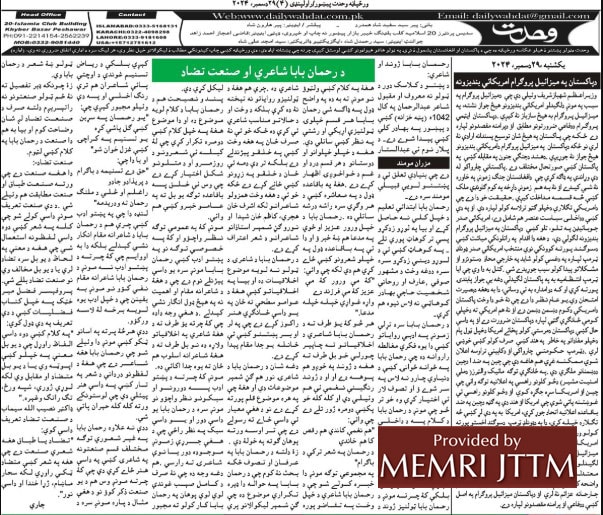The following report is now a complimentary offering from MEMRI's Jihad and Terrorism Threat Monitor (JTTM). For JTTM subscription information, click here.
In an editorial, Pakistan's Pashtu-language daily Worazpanra Wahdat accuses outgoing U.S. President Joe Biden of saddling the incoming Trump administration with sanctions on Pakistan's ballistic missile program.
"U.S. President Joe Biden, while leaving [the White House], has imposed sanctions on Pakistan's missile program. By doing so, his steps may cause challenges and difficulties for the newly elected U.S. President Donald Trump on the external front in the months to come," the editorial said.
Indicating that the U.S. may no longer need a nuclear-capable Pakistan to advance its foreign policy goals, the Pashtu daily also stated: "At present, the prevailing view is that Pakistan is not an adversary of any enemy of the U.S., nor does the U.S. need Pakistan for any particular purpose."

A screenshot of the Pashtu daily's editorial page.
Following are excerpts from the editorial:
"American Sanctions On Pakistan's Missile Program
"Prime Minister Shehbaz Sharif has said that the American sanctions imposed on [Pakistan] due to the missile program have no justification, and no deal can be struck on the [ballistic] missile program. Pakistan's nuclear program is aligned with its defense needs, and intended solely for peaceful purposes, because Pakistan harbors no expansionist ambitions. Therefore, there is no justification for the U.S. sanctions on Pakistan's missile program.
"Contrary to India's war frenzy [i.e., India's missile and nuclear program], the situation in Pakistan is different. Pakistani officials have already made it clear that the Afghan war cannot be fought on their land, nor can any interference be made from [the Pakistani] side to any neighboring country.
"It is a fact that American policies primarily serve their own interests, and there often involves the element of internal politics in it. U.S. President Joe Biden, while leaving [the White House], has imposed sanctions on Pakistan's missile program. By doing so, his steps may cause challenges and difficulties for the newly elected U.S. President Donald Trump on the external front in the months to come. It remains to be seen whether the Trump administration will lift these unjustified sanctions on Pakistan or choose to maintain them permanently. This will be the test of his insight.
"At present, the prevailing view is that Pakistan is not an adversary of any enemy of the U.S., nor does the U.S. need Pakistan for any particular purpose. In such a situation, instead of extending support to Pakistan, the U.S. is interested in focusing all its attention on their interests in India.
"The Trump government officials and the likely members of his cabinet announced so far are the same people who are anti-China and friends with China's enemies, particularly Mike Waltz [the nominee for national security advisor] who has been openly saying for several years that China and the U.S. are involved in a cold war. His demand still remains: that the U.S. and India should jointly declare an alliance against China.
"What policy the U.S. will adopt in this regard will become clear after Donald Trump takes the oath. However, it is a fact that Pakistan-U.S. relations are of immense importance. Pakistani officials, instead of reacting emotionally to the removal of U.S. concerns on the missile program and sanctions, will need to adopt a balanced approach to address the issue based on reason and evidence. Pakistan has no aggressive intentions against anyone, including the U.S., and the Pakistan missile program is actually for defense and peaceful purposes."
The full text of this post is available to subscribers.
Please login or register to request subscription information from MEMRI





